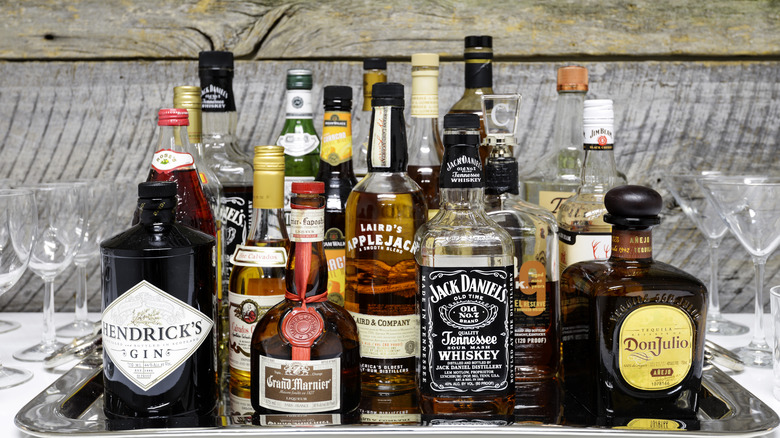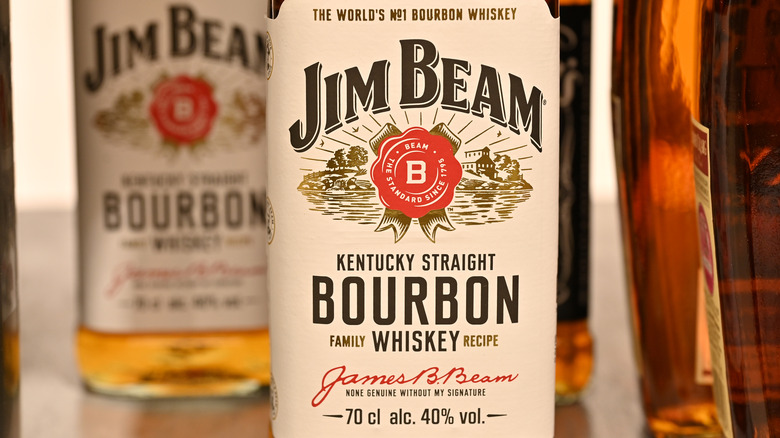Vanilla Substitutes You Can Grab Straight From The Bar
There are baking must-haves you can't get around if you're whipping up a homemade birthday cake, a batch of cookies, or maybe a batch of brownies. You're going to need, nine out of ten times, the staples of flour, sugar, perhaps eggs, likely butter or oil. And then there are those ingredients you can hack and substitute your way around when push comes to shove. Those that are still crucial to the overall flavor and integrity of the recipe, but allow for a little flexibility if you find yourself halfway into a recipe and only then realize you're short an ingredient.
One such ingredient is vanilla extract (worth noting, vanilla extract and vanilla paste are two different things, with vanilla essence being its own thing as well.) While just a teaspoon or so adds a lot to any baked good (more on that later,) you can head to your bar cart and raid your cocktail-making supplies for substitutes that will do the job in a pinch — and when you don't feel like making an unexpected run to the grocery store. Namely, bourbon, brandy, and even rum will add the same richness, and depth of flavor that vanilla extract lends, and the booze will bake off as your cake or batch of cookies cook, leaving virtually none of the alcohol. If a recipe calls for one teaspoon of vanilla extract, double it — adding two teaspoons of the hard stuff — whichever dark liquor you're working with.
A dash of bourbon can mimic the flavor of vanilla particularly well
If you've ever taken a whiff of vanilla extract out of the bottle (and if you haven't, you're missing out on a heavenly aroma!) you've probably noticed the slight alcoholic twang to the scent. That's because to make extract, vanilla beans are soaked in alcohol. The trademark flavor comes from the vanillin found in the vanilla bean pod itself, but the mixture of water and alcohol they're soaked in draws out the flavors and creates an infusion of sorts, with the vanilla flavor seeping into the liquid. The process is time-consuming and can't be rushed — which is why inexpensive vanilla essence is not the same thing in terms of price or flavor!
Bourbon or whiskey, you may have noticed, have a decided vanilla-adjacent note to their flavors, hence their particular attractiveness as a substitute. This is partly because bourbon is aged in oak barrels, and the oak wood itself contains naturally occurring vanillin compounds. Yes — the same compounds found in vanilla bean pods, responsible for the signature vanilla flavor!
Rotate through your bar options — bourbon, whiskey, and rum all impart a rich, caramelly flavor, but for this reason, bourbon may be the closest match to the real deal. And far cheaper, ounce per ounce, than the pricy vanilla extract.
Vanilla adds more than you might realize to baked goods
Just why is vanilla or at least an adequate vanilla substitute from the bar so crucial for recipes and so make-or-break for the flavor? It's one of those far-down-the-ingredient list items you might deem skippable if you didn't notice any better. Most recipes only call for a teaspoon or so, but while the quantity you add might be meager relatively speaking, it's one of the ingredients that punches above its weight in terms of the flavor and notes it adds. Leave it out, and you might not be able to pinpoint its absence, but you'll know a certain something is missing.
Much like how a dash of salt punches up flavor or a douse of acid (lemon juice or vinegar) adds depth and brightness to otherwise one-dimensional or flat-tasting dishes, vanilla can liven up a recipe whether it be for a classic vanilla cake, chocolate chip cookies, or buttercream icing. The vanilla flavor can help bring out other flavors, add rich caramel sweetness, and generally make your recipes that much more craveable. Before you drop everything to run to the grocery store though, your home bar selection will absolutely do the trick — and you may even discover you prefer the richness (and the money saved!) that using liquor provides!


